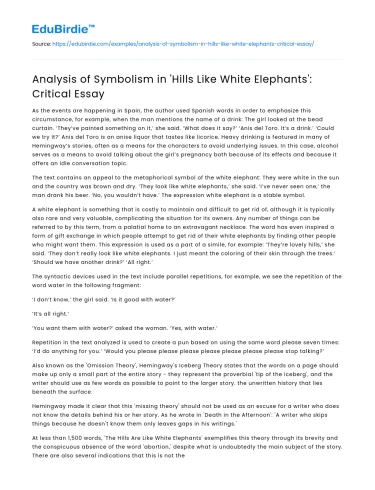As the events are happening in Spain, the author used Spanish words in order to emphasize this circumstance, for example, when the man mentions the name of a drink: The girl looked at the bead curtain. ‘They’ve painted something on it,’ she said. ‘What does it say?’ ‘Anis del Toro. It’s a drink.’ ‘Could we try it?’ Anis del Toro is an anise liquor that tastes like licorice. Heavy drinking is featured in many of Hemingway’s stories, often as a means for the characters to avoid underlying issues. In this case, alcohol serves as a means to avoid talking about the girl’s pregnancy both because of its effects and because it offers an idle conversation topic.
The text contains an appeal to the metaphorical symbol of the white elephant: They were white in the sun and the country was brown and dry. ‘They look like white elephants,’ she said. ‘I’ve never seen one,’ the man drank his beer. ‘No, you wouldn’t have.’ The expression white elephant is a stable symbol.
Save your time!
We can take care of your essay
- Proper editing and formatting
- Free revision, title page, and bibliography
- Flexible prices and money-back guarantee
A white elephant is something that is costly to maintain and difficult to get rid of, although it is typically also rare and very valuable, complicating the situation for its owners. Any number of things can be referred to by this term, from a palatial home to an extravagant necklace. The word has even inspired a form of gift exchange in which people attempt to get rid of their white elephants by finding other people who might want them. This expression is used as a part of a simile, for example: ‘They’re lovely hills,’ she said. ‘They don’t really look like white elephants. I just meant the coloring of their skin through the trees.’ ‘Should we have another drink?’ ‘All right.’
The syntactic devices used in the text include parallel repetitions, for example, we see the repetition of the word water in the following fragment:
‘I don’t know,’ the girl said. ‘Is it good with water?’
‘It’s all right.’
‘You want them with water?’ asked the woman. ‘Yes, with water.’
Repetition in the text analyzed is used to create a pun based on using the same word please seven times: ‘I’d do anything for you.’ ‘Would you please please please please please please please stop talking?’
Also known as the 'Omission Theory', Hemingway's Iceberg Theory states that the words on a page should make up only a small part of the entire story - they represent the proverbial 'tip of the iceberg', and the writer should use as few words as possible to point to the larger story. the unwritten history that lies beneath the surface.
Hemingway made it clear that this 'missing theory' should not be used as an excuse for a writer who does not know the details behind his or her story. As he wrote in 'Death in the Afternoon': 'A writer who skips things because he doesn't know them only leaves gaps in his writings.'
At less than 1,500 words, 'The Hills Are Like White Elephants' exemplifies this theory through its brevity and the conspicuous absence of the word 'abortion,' despite what is undoubtedly the main subject of the story. There are also several indications that this is not the first time the characters discuss the issue, such as when the woman interrupts the man and completes his sentence in the following conversation:
“I don’t want you to do what you don’t want to...”
“And it doesn’t feel good to me,” she said. 'I know.'
It is clear throughout the story that the man would like the woman to have the operation, which he describes as 'terribly simple', 'completely simple', and 'not an operation at all'. He promises to stay with her all the time, and that they will be happy afterward, because 'it's the only thing that worries us.'
He never mentions the woman's health, so it can be assumed that the operation is not to cure the disease. He also often says that she doesn't have to do it if she doesn't want to, indicating that he is describing an elective procedure. Finally, he claims that it is 'just to let the air in', which implies an abortion and not any other additional procedure.
When a woman asks, 'Do you really want to?', she asks a question that suggests the man has an opinion on the matter—that he has something at stake—which is another sign that she is pregnant.
And his reply that he is 'quite willing to go through with it if it means anything to you' does not refer to the operation, it refers to not having a job. In the case of pregnancy, not having an abortion is something 'to go through' because it results in the birth of a child.






 Stuck on your essay?
Stuck on your essay?

